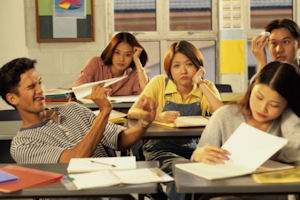 Julie Landry’s autistic son had trouble adapting to 2nd grade in Fairfax County schools. The rambunctious lad was prone to outbursts. In one incident in April, the boy ignored instructions during P.E. class, ran around the gym, yelling and throwing volleyballs, and, when teachers tried to restrain him, punched, kicked, head-butted and bit multiple staff members. Three were injured and required medical attention.
Julie Landry’s autistic son had trouble adapting to 2nd grade in Fairfax County schools. The rambunctious lad was prone to outbursts. In one incident in April, the boy ignored instructions during P.E. class, ran around the gym, yelling and throwing volleyballs, and, when teachers tried to restrain him, punched, kicked, head-butted and bit multiple staff members. Three were injured and required medical attention.
So, here’s the question. How do we balance the rights of the Landry boy to a “mainstreamed” education versus the rights of other students to not have their classroom disrupted?
A panel of school officials and special-education experts, reports the Washington Post, determined that the lad’s actions were caused by his disability, a finding that saved him from facing expulsion. School authorities did reassign him to a different school — an action defended on the grounds of protecting staff members — and the Landry family appealed the decision. After a lot of back and forth, the boy was admitted to the private Phillips School in Annandale; his tuition will be paid by the Comprehensive Services Act.
The Landry kid is just one of thousands of children with disabilities in Fairfax schools. In the 2011-2012 school year, the 14% of the school population classified as disabled accounted for 40% of long-term suspensions. Last month the School Board voted to revise school discipline policies to address the disparity in mandatory suspensions and expulsions.
It’s not easy raising “normal” kids. I know — I have three! It has been rewarding but never easy. My heart goes out to parents with children with disabilities, and I cannot blame them for wanting the best for them. But disabled kids are not the only ones with rights. Children who don’t disrupt classes have rights, too, among them the right to attend classes where teachers don’t spend a severely disproportionate amount of class time dealing with behavior problems.
Julie Landry says she’d love for her kid to be in his base school, “making connections with his peers in the neighborhood.” Yes, that would be nice. But does that nicety trump the right of kids in the neighborhood to their own education? It sounds like the best decision was reached — the Landry boy will attend a specialized facility designed to accommodate special needs students.
That still leaves the other 60% of disciplinary cases caused by students who are not “disabled.” Many, no doubt, are poor and have not been socialized according to middle-class behavioral norms. I’m sure every one of them has a heart-wrenching tale to tell. Most were neglected, abused or suffered extreme hardship in some way. What about their “rights?”
Here’s my argument: My right to swing my fist ends at your nose. Likewise, no one has a “right” to participate in a class where they disrupt another child’s education. If a kid suffers from a disability, socio-economic disadvantage or just lousy parenting, that’s a personal tragedy. School systems should have places where such kids can continue their education. But their right to an education should not supersede the same right of students who are able and willing to behave themselves.
— JAB


